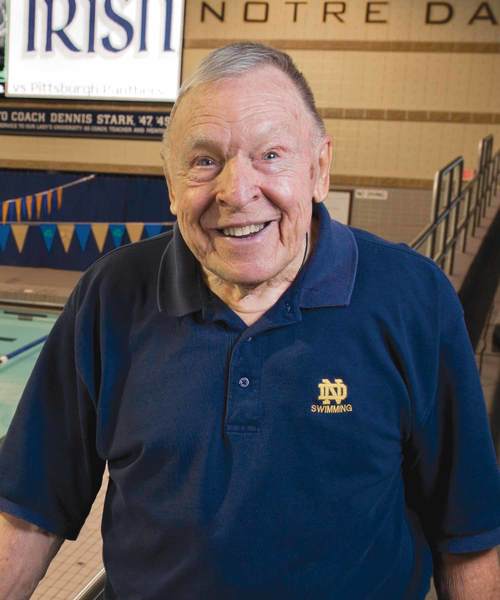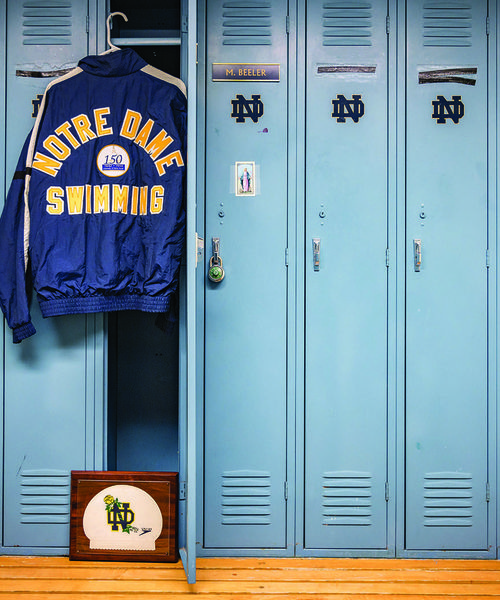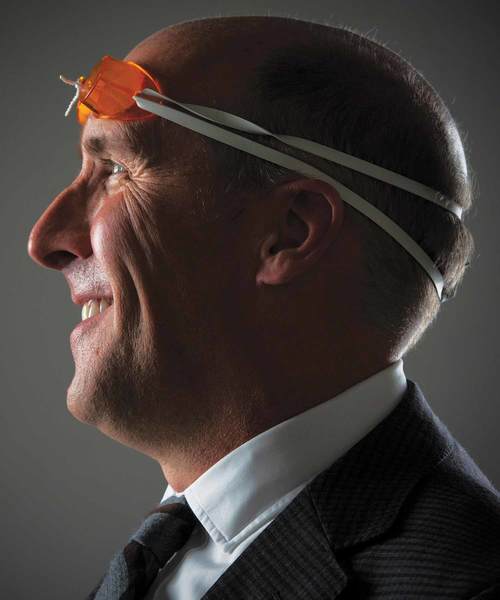
Dennis Stark
A Special Olympics Champion
One day, a few years back, longtime University of Notre Dame swimming coach Dennis Stark received a phone call out of the blue from one of his former athletes to share some good news: the swimmer and his wife had just had a baby.
The cheery conversation went on and on, as those sort of chats usually do—the congratulations, how are you and the wife doing now, everything going okay at work. It was a typical catch-up type of exchange, all of us having had the same conversation dozens of times.
Then, just before they were going to hang up, the new dad told Stark something that has stayed with him since. The baby, he said, was born with Down syndrome and he and his wife were going to raise the child in a home filled with love and joy because Stark and his wife, Angeline, had previously showed them the way. In fact, that swimmer already had a solid foundation and experience that would make for a good and blessed life with their new baby.
Dennis Stark is a Notre Dame lifer and his legacy is as burnished as any of the big names from the big-time sports. But to those of us who have known him for decades (he was my freshman year swimming instructor, and really, he tried his best with me) it is the personal side of Stark that will always be remembered above everything else he accomplished as a coach.
Kenny Stark, the fifth child of Angeline and Dennis, was also born with Down syndrome, and for the next several decades a story unfolded that not only needs to be told but also should never be forgotten. Strong of Heart, the title of this book, could easily be the story of Kenny Stark, his family and a Notre Dame community that wrapped its arms around them. It was the Stark family and the Notre Dame community that eventually led to one of the most spectacular events ever held on this campus, the International Special Olympics in 1987, and triggered a commitment from thousands of students, including many athletes over the years, to children with special needs.
But it wasn’t always like that. In fact, we do not have to go that far back to a different time and a different attitude, one that was often unpleasant, even harrowing. Dennis found that out on a very personal level, even before Kenny was born—and the memory of it still is with him more than a half-century later.
Stark and his wife were living on the east side of South Bend when he noticed something “odd” about a house across the street. The curtains on an upstairs room would always close if someone on the outside seemed to be looking that way. One night, Dennis was in an upstairs room of his own, one without lights, and he looked out his window to that window across the street and he saw a woman holding a little child, a child, until that moment, Dennis did not know existed. It took a lot of courage, but a few days later he decided to cross the street and knock on the door. There was nothing evil going on in that house, no ready-made script for a scary movie. There was just a child and a loving mother who was keeping her little one away from a society who would deem the baby as “retarded”—and that was a reaction she could not handle.
It was like that then—and even worse before—and we have some way to go yet today in our acceptance of those with special needs. We still have people with good intentions organizing campaigns on campus to eradicate the word “retarded” from the general vernacular.
But we have come a long way. When Kenny was born in the 1960s, the doctors couldn’t know for sure that something was wrong, only telling Angeline and Dennis that their son might be handicapped, even “retarded,” and that they should think about giving him up. That may seem shocking today, but it wasn’t then, and it happened quite often—the child given up for adoption. But the Starks were not about to give up—and with the love and support of four older siblings and dozens of people at Notre Dame, an enduring love story was about to unfold. Even those of us on the periphery of the story are better for it.
To this day Stark is reluctant to talk about his work with Special Olympics because he thinks there was nothing really special about what he did. He believes that, instead, it always has been the Olympians who are doing something special and deserve all the accolades.
Many others think otherwise, including the Notre Dame Monogram Club, which gave Stark the Moose Krause Distinguished Service Award in 2010 for his life’s work. He coached the Irish men’s swimming team from its start as a varsity sport in 1957 to 1985 and was the man who turned a fledgling women’s program into what it is today.
Along the way those swimmers learned a lot more than the nuances of the perfect breaststroke. They learned how lucky they are in life because Kenny Stark became a part of their lives. Dennis would bring his son over to swim, and it didn’t take long before the swimmers made him a part of their team. It worked out so well that Dennis came up with an idea: Why not have other youngsters in the same situation come over, too?
So he went to Logan Center, the school for the developmentally disabled just south of campus, and worked out an arrangement so that many other students could come to Notre Dame and enjoy a few hours a week in the pool. For the Notre Dame swimmers it was an education and a challenge they took on with gusto. The Logan students became an inspiration—and it just became bigger and bigger after that.
Stark thought, why not up the ante? So he asked his swimmers if they could donate one hour a day volunteering at Logan. They did so without reluctance, and that enthusiasm spread to other athletes and students at Notre Dame. The University is justifiably proud of the volunteer work of its students—and it was that one-hour-a-day idea that became the template for what still goes on today.
When the International Special Olympics event came to campus, many of those former Irish swimmers were the first to volunteer, coming from across the country to help anywhere they could. It didn’t matter if it was swimming or softball because they were coming to honor Dennis and Kenny and the dozens of kids at Logan who touched their hearts and, as they will tell you, made them better people.
For many, their most vivid memories involved how they hated to see the event end and how they hoped someday everyone might be able do it again.
Never, ever feel sorry for yourself, Dennis Stark tells me. Instead, take what you have in life as a blessing and a joy.
For the Starks, everything about Kenny was a joy to be shared. Like the time Kenny got his first paycheck from the Logan Industries and he and his dad went off to the bank to open an account. The first deposit was less than a dollar.
Or the time Regis Philbin came to campus for a football weekend and Kenny went up to him with one question, “Where is Kathie Lee?”
Dennis Stark is now 89 years old—and he’s certain he has lived a blessed life and that he never felt sorry for himself and that the Lord put him here for a reason. We should all be so lucky to have such an enriched life and one that still has much to give.
He writes an annual letter to his former swimmers (email, I might add), bringing them up to date on events on campus. He still goes to every football game, but there are new people in the seats next to him.
Angeline is gone. Kenny is gone.
Always appreciate what you have, Dennis Stark tells me, even if you don’t have it anymore, because you always will have the memories and the friends and the Notre Dame family that helped make it that way.

